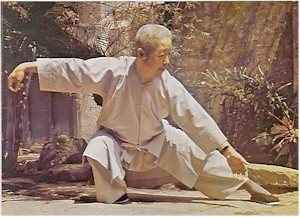
鄭曼青
Zheng Manqing
(Cheng Man-ch'ing)
Zheng Manqing (Cheng Man-Ch'ing) (1902-1975), a taijiquan student of Yang Cheng Fu, is one of the most influential taijiquan practitioners in history. Zheng is well known for his 37 posture form, a form which eliminates many repetitions of previous forms. He is also noted for being one of the early practitioners to bring taijiquan to the United States and to also teach non-Chinese. Zheng was also a poet, painter, calligrapher, and traditional Chinese medicine doctor; a "master of the Five Excellences". He was also a scholar and philosopher, and taught students about Kong Fuzi (Confucius) and Laozi (Lao Tzu). He earned the titles "Professor" and "One Dose Zheng". His style reflects a diverse mix of wen (scholarship) and wu (martial) and promotes relaxation, sensitivity, coordination, timing, balance, and is effective for self defense. A syllabus of Zheng taijiquan consists of the taijiquan principles, 37 posture form, sensing hands practice, da lu, martial application of the postures, sword form, and supplementary exercise. Some of the principles emphasized in this style of taijiquan are: relax (sung), separate weight, body upright, turn the waist, beautiful lady's hand, invest in loss, momentate from one move to the other (dong dang), and swimming on land.
Zhengmanqing.com is proud to be a participant in the Amazon Services LLC Associates Program, an affiliate advertising program designed to provide a means for sites to earn advertising fees by advertising and linking to Amazon.com, and may also participate in other widely recognized affiliate programs with similar goals. Contact me for inquiries.